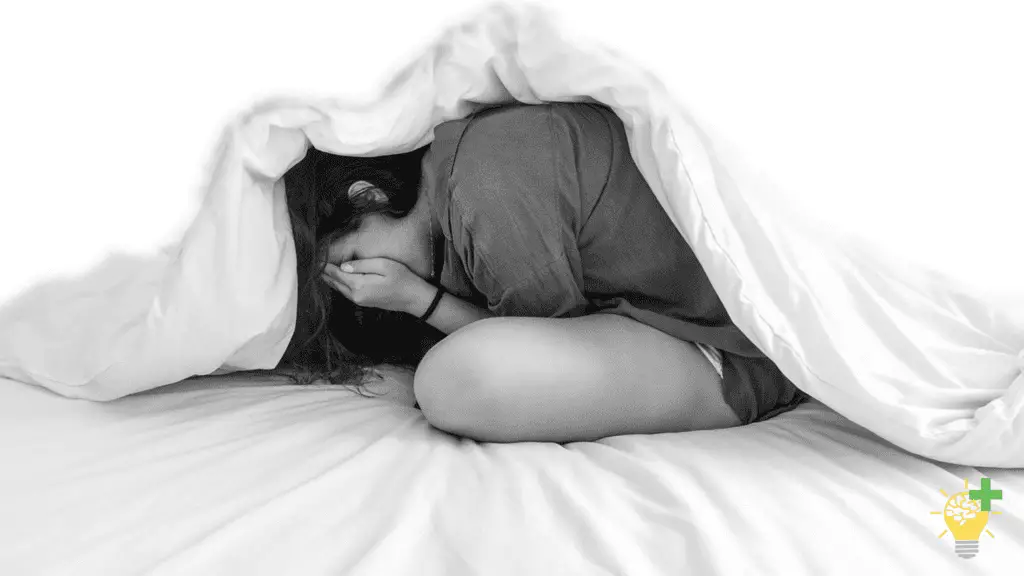I discussed effective ways to tackle anxiety at night in an earlier article. You can check it out here if your anxiety level tends to get worse at night.
But if you feel more anxious in the morning, this article is for you.
Morning anxiety can ruin the rest of your day if you don’t know how to deal with it. Several factors can make anxiety worse at the start of the day. This can range from higher hormone levels to feeling overwhelmed by the day’s activities.
Whatever the cause, racing thoughts and excessive worrying in the morning is not a pleasant way to start your day. Fortunately, you can do something about the problem, and this article will show you exactly how to fight this problem.
But first, what are the signs of morning anxiety? And why is anxiety worse in the morning? The answers to these questions will give you an insight into how to properly deal with the issue, so let’s get things started by getting some answers.
Signs of Morning Anxiety
Living a happy life is great, but it is unrealistic to be happy all the time. Even people who’ve consistently trained their minds using positive thinking exercises still sometimes wake up in a bad mood.
Here’s the point.
You don’t necessarily have anxiety because you wake up ticked off about something. Feeling a little concerned about a big event in the day or how to tackle some troublesome issue aren’t necessarily signs of anxiety.
Worrying too much about a situation is what anxiety is all about. You probably have morning anxiety if you consistently experience one or more of the following:
- A feeling of fatigue right after you wake up
- Feeling edgy or restless, sometimes for no apparent reason
- Increased blood pressure
- Higher than normal heart rate or increased tension in your muscles
- Difficulty breathing or tightness in the chest
- Easily irritable and difficulty concentrating
- Feeling anxious over little issues
Why Is Anxiety Worse in the Morning?
High Cortisol Level
Your hormones play a huge role in how you feel, which is why balancing them is essential to maintaining your mood and emotional health.
One of the essential hormones in your body is cortisol, the stress hormone. In addition to affecting nearly all tissues and organs in the body and controlling the body’s metabolism, cortisol regulates the body’s stress response.
Although the hormone is released when you feel stress or fear, research indicates that cortisol levels are usually highest within the first four hours of waking up in people who constantly experience higher stress in their daily lives.
In other words, if you consistently wake up with a sinking feeling in your stomach, your cortisol level is likely high in the morning.
You don’t have to worry that something is wrong with you because you have a higher cortisol level in the morning.
A slightly higher cortisol level is normal in the morning – that’s when the hormone is naturally at its highest.
You can’t prevent your cortisol level from slightly going up in the morning. But the good news is that you can stop the hormone from rising too high that it causes anxiety, whether in the morning or night. How exactly do you do that? I’ll get to it in a bit.
Going to Bed Feeling Anxious
What’s your mood from the previous night? If you go to bed feeling anxious, there’s a high chance you’ll wake up with anxious thoughts.
Although you may not be actively thinking worrisome thoughts while you sleep, your cortisol level will likely spike as soon as you wake up in the morning. This is to help you stay focused and alert at the start of the day to face any stressful situation bothering you from the previous night.
While this natural coping mechanism is actually a good thing, living in a constant state of heightened alertness (known as hypervigilance) can lead to sleep issues and worsen your anxiety.
General Anxiety Disorder
If you experience anxiety most mornings, it might be a sign of generalized anxiety disorder (GAD). This is especially the case the problem has been going on for more than six months.
Typically, you experience excessive worry and tension about everyday issues and situations, such as family, health, finances, or work.
GAD makes it difficult to get a grip of yourself when the wave of worry sweeps over you. You might also have trouble concentrating and feel on edge most of the time.
High Caffeine and Sugar Consumption
What you consume in the morning can increase anxious feelings, especially if you already have anxiety.
Like most people, you probably drink a cup of coffee first thing in the morning. While there is nothing wrong with this habit, coffee contains caffeine, which can worsen anxiety symptoms.
If you already have anxiety, you’ll likely experience an increase in your heart rate or feel a bit jittery after drinking coffee in the morning.
Eating too much sugar in the morning, particularly foods containing refined sugar, can sharply drop your blood sugar levels. In turn, you might feel wound up or even tired for no apparent reason.
And while we are still on the subject of what to eat and drink, you should consider cutting back on alcohol if you have anxiety. That’s because alcohol can trigger panic attacks (or similar signs) in people with anxiety, regardless of what time of day you drink it.
How to Deal With Morning Anxiety
While it is normal to experience occasional anxiety, frequent cases of racing thoughts and uncontrollable nervousness when you wake up can leave you frustrated, and asking why anxiety strikes harder first thing in the morning.
If you have GAD or chronic anxiety, it can significantly disrupt your daily functioning, so your best bet would be to work with a professional to learn coping methods to deal with the problem.
A mental health professional can recommend antidepressants or other medications to relieve anxiety symptoms. Psychotherapy is another strategy to help you learn effective ways to reframe the thought patterns that cause anxiety.
However, if you are sure that your morning anxiety isn’t a chronic issue, you can use the following tips to deal with the problem.
1. Get Enough Sleep at Night
Having a good night’s sleep can reduce your chance of feeling anxious when you wake up in the morning. To have enough sleep:
- Make sure to go to bed early
- Avoid potentially agitating situations before bed
- Don’t bring screens (laptops, phones, tablets) to bed
- Avoid consuming foods and drinks that interrupt sleep
2. Reduce Overall Stress
Develop the habit of stepping away from stressful situations both at home and work. Don’t overwork yourself, and avoid taking your work home with you. Whatever you can’t get done during work hours should be left until the next day.
Create time to relax at home, even if you have plenty of items left undone on your to-do list. There’s almost zero chance that your world will go awfully wrong just because you take short breaks between tasks.
3. Limit Consumption of Sugar and Processed Food
Cut back sugar and processed food, and eat foods rich in healthy fats and proteins instead.
If you experience anxiety in the morning, your cortisol level is probably high, making you extra alert. For this reason, you want to avoid anything that will trigger psychological responses similar to anxiety.
That’s my way of saying limit your caffeine intake. Morning anxiety already puts you on high alert. There is no point in worsening it by consuming substances that can increase the uncomfortable feeling.
4. Exercise in the Morning
People who have a habit of getting in a good workout in the morning are less likely to ask, “Why is anxiety worse in the morning?” because exercise is great for calming an anxious mind.
Here’s how.
A good workout in the morning reduces the chance of getting into a fight-or-flight mode. It reduces your cortisol level, so you’re not put on high alert.
The good thing is that even 15 minutes of exercise in the morning can be highly effective in fighting back anxiety.
5. Write Down Your Concerns
Instead of spending your mornings ruminating over all the things you need to do, grab a paper and make a to-do list or pen down what’s making you anxious in a journal.
This simple exercise can significantly reduce racing thoughts because you’ve moved the worrisome thoughts from your head onto your journal or paper.
Writing down your worries may not automatically solve them, but it means you won’t expend energy trying to work everything out mentally and creating unnecessary tension.
6. Practice Meditation and Deep Breathing Exercises
Trying to push against worrisome thoughts might amplify them sometimes. A gentler and more effective approach is simply noticing the thoughts, acknowledging them, and letting them fizzle off on their own.
You can do this using deep breathing exercises. If you’re having trouble shaking off anxious thoughts in the morning, simply take some slow, deep breaths without judging or criticizing the thoughts. This can help calm your body and mind.
Meditation is another effective way to reduce anxiety. I’ve written extensively on how to do it in this article. I recommend checking it out if you have morning anxiety.
7. Start Your Day With Gratitude
Gratitude is one of the habits that can make a huge difference in your life, whether or not you have morning anxiety.
Starting your day with a grateful heart can positively impact your mood for the rest of the day. What are you grateful for? If possible, take a few minutes to write them down in your journal every day.
Some days when you can easily think of what you are grateful for, reach for your gratitude journal and read a few lines. It will keep your mind focused on the positives instead of the things you’re worried about.
8. Don’t Rush Into Your Day
Avoid rushing out of bed in the morning because being in a hurry can increase your anxious feelings.
Cultivate the habit of waking up early to get mentally and physically prepared for the day before stepping into your day.
9. Do More of What Makes You Happy
What do you enjoy doing the most? Make a list of what you are good at and things that bring you joy and do them.
The happier things you do, the better you feel. And if you feel better, you are less likely to wake up feeling anxious. This approach tackles anxiety from the inside out and is highly effective.
10. Deliberately Shift Your Attention from Worrisome Thoughts
Distract yourself once you notice worrisome thoughts coming on when you wake up. However, instead of shifting your attention to unproductive things, consider focusing on positive things.
For example, spend 10 to 15 minutes listening to positive thinking podcasts to redirect your thoughts.
11. Be Present
Here’s the thing about anxiety or worry; it “transports” your mind into the future or past, where you have no control, and makes you feel unnecessary tension about things that may never happen or that are already in your past.
You can’t change what’s happened in the past and worrying about the future won’t change anything either.
Your power is in the present.
And one way to tap into that power is to immerse yourself in each moment. Practice mindfulness when you wake up. Bring your mind to the present, engage all your physical senses, and appreciate your experiences.
Conclusion
Why is anxiety worse in the morning? The problem usually involves heightened cortisol levels, which prevent you from relaxing and lets those negative thoughts slip in. Morning anxiety can also indicate a more serious problem like chronic anxiety.
Thankfully, you can manage the problem, whether caused by an occasional spike in hormone level or an underlying mental health disorder. Lifestyle changes can improve the situation, although you might need professional help if you have chronic anxiety.







![7 Best Apps To Improve Self-Esteem : [How to Make 2023 Amazing] 8 7 Best Apps To Improve Self-Esteem [2022]](https://thinkpositivecheck.com/wp-content/uploads/2022/02/7-Best-Apps-To-Improve-Self-Esteem-2022-1024x576.png)